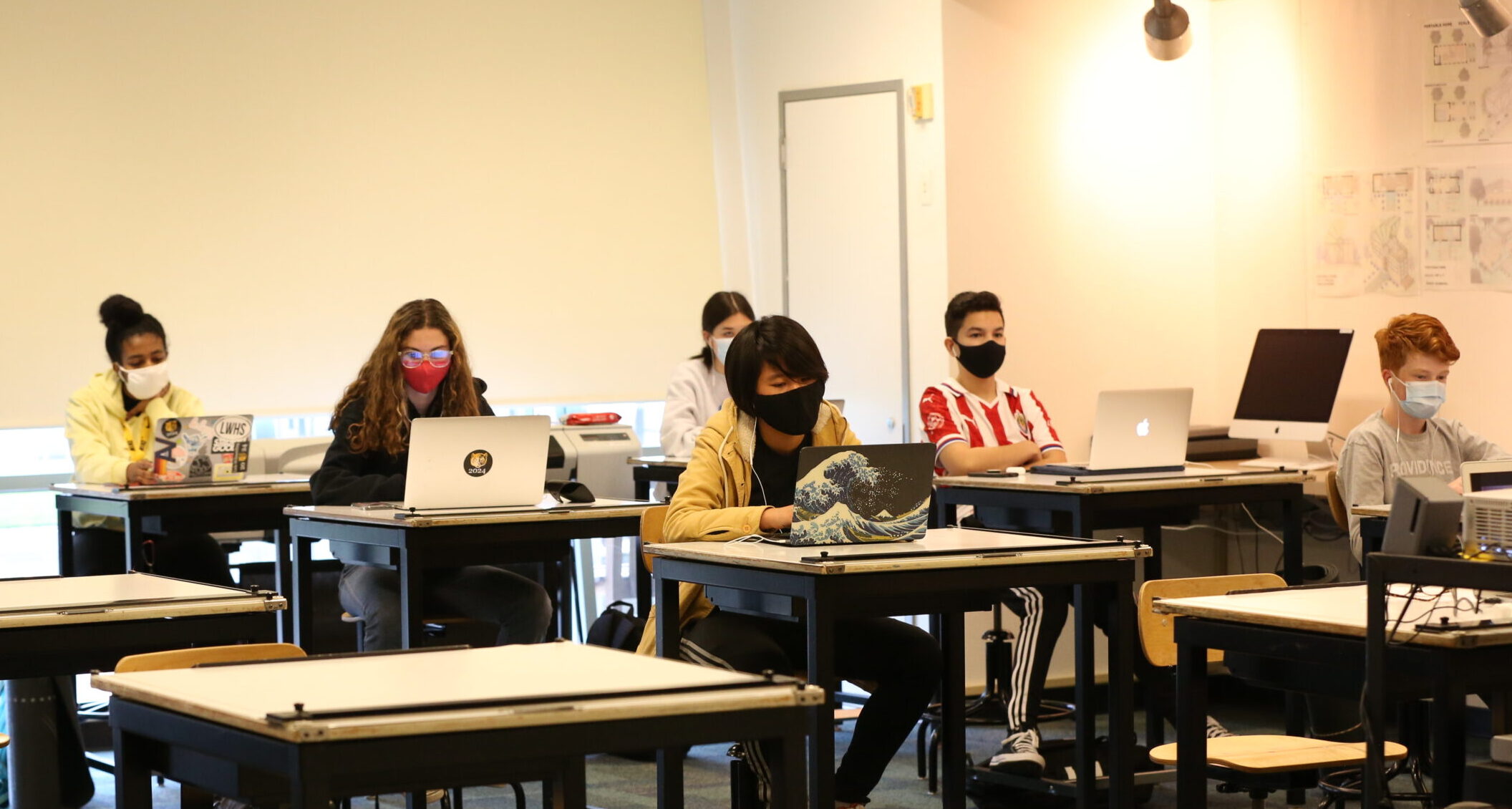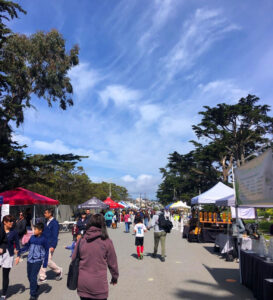Do you recall the mornings of the COVID-19 pandemic? Hazily stumbling out of bed to return to a droning routine of Zoom calls, outdoor walks and Netflix-filled afternoons? For Lick-Wilmerding High School’s graduating class, the worldwide pandemic marked the initiation of their high school years, and as their LWHS careers come to an end, so do the memories of online learning. In their final weeks at LWHS, the class of 2024 reflects on the challenges and complexities of their Frosh year. Here are their stories.
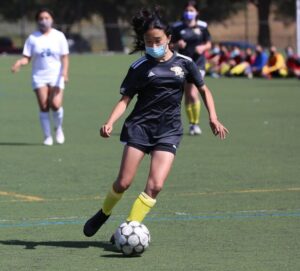
photo courtesy of Vidigami
Ariel Fu-Chen
Many students reported that social dynamics were completely different through online classes. Teachers often used the Zoom feature of “breakout rooms” to get classmates to collaborate, but it was difficult for students to engage with each other through the screen. Ariel Fu-Chen ’24 remembered how difficult it was to form deep connections with her classmates online compared to in-person. “You had no idea what they were actually like, because everyone [was] just so tired [on Zoom],” she said. However, on “Async Wednesdays,” students found themselves with more free time to complete some asynchronous schoolwork, submit their COVID-19 rapid tests and attend advisory conferences. Without a strict schedule of classes, they had a chance to meet and get to know each other in-person. Fu-Chen also recalled a lot of gradewide “meet-ups” at Golden Gate Park.
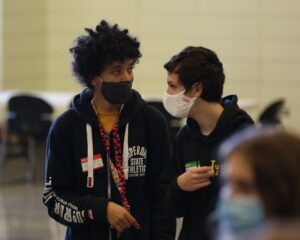
photo courtesy of Vidigami
Joshua Patterson
While students dealt with many mental challenges getting through the days of online learning, many students also dealt with other complications that arose: complicated living situations, distant geographical locations and resource availability, including reliable Wifi, desk space or their own room. Joshua Patterson ’24 particularly struggled with WiFi, especially because his older brother returned home from college and took Zoom classes online as well. This addition totaled to four other people in his house: his sister, brother and parents, all using the internet at the same time. “Sometimes I just couldn’t get into class, or it would just be like…[Patterson imitated zoom-glitching sounds].” This was a common issue among students, even those who had not encountered internet issues before the pandemic. Since many students had their cameras off, other students would feel uncomfortable with their cameras on. “They would all say the same thing,” Patterson said. “‘My Wifi sucks,’ and turn their cameras off.” The result was a screen full of black boxes and the voice of a very confused teacher. Patterson reflected that having the option to turn off his camera allowed him to form bad habits, like waking up just minutes before logging into class without giving himself a second to eat breakfast and get ready for the day.
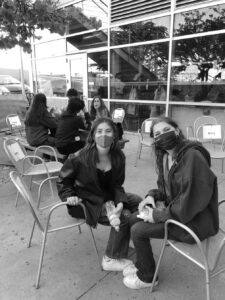
photo courtesy of Vidigami
Ivy Kilar
Although participation through Zoom was difficult, teachers used many interactive resources that were mailed to students to encourage them to engage more in class. Students were given sketch pads and whiteboards to display their answers on Zoom. This triggered more productivity for some students, while others had to prepare themselves for long work periods. Ivy Kilar ’24 reflected that she needed to put extra work into focusing during online learning. “During COVID-19, I needed to create environments that would trigger that productivity….I would light candles, change the lighting, play productive music or clear my desk,” she said.
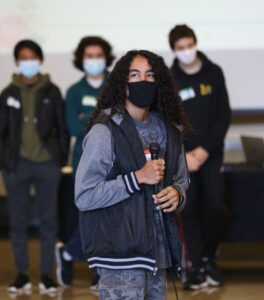
photo courtesy of Vidigami
Ausar Honable
During online learning, the redundancy of students’ schedules and staying in their room throughout the school day made certain students feel a strain on their mental health. Students felt agitated, isolated or unmotivated to complete their work online. A particular challenge was staying focused in class. To cope with his restlessness, Ausar Honable ’24 adopted a variety of different sitting positions throughout his day on Zoom. “I sat in the chair in all the positions you could possibly imagine, like criss-cross applesauce…my feet on my desk…or, standing with my computer in [one] hand, pacing around my room,” he said. Honable also moved his desk into his closet to make a makeshift “office,” but still felt trapped. “I’m in an office like a box, and then [I’m] looking at [myself] on the screen in a box. So many boxes,” he said.
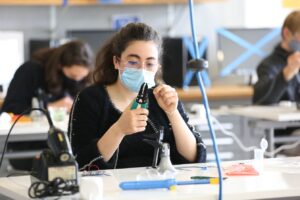
photo courtesy of Vidigami
Lori Agbabian
Although many students were grateful for the change of scenery, coming to LWHS — dealing with all of the awkwardness of wearing masks, staying six feet apart and following health rules — posed a lot of challenges. On the carpeted floor, blue-taped arrows guided the students down “one-way” hallways to class. Hula hoops separated students during lunch while they ate on Frosh hill. Students were divided into Lunch groups and were prohibited from eating with new people. Additionally, desks were isolated to sit in rows, several spaces away from one another. Some students had to deal with small issues that complicated their in-person learning. For Lori Agbabian ’24, this was wearing a mask with glasses. “I had to engineer the mask to fit with the [frames]… so that when I breathed, my glasses wouldn’t fog up and I could actually see,” she said. It made reading really difficult, and sometimes impossible.
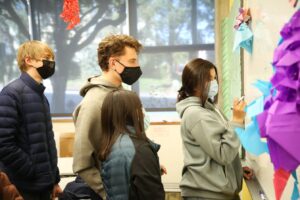
a math equation.
photo courtesy of Vidigami
Arianna Ponce
As the class of 2024 is graduating, going off to college and moving onto the next big step in their lives, one student found it important to reflect on the significant positive impact the pandemic had left on her. Arianna Ponce ’24 felt that although there were many challenges throughout the pandemic, she found appreciation for the change that her Frosh self went through during the pandemic.“Because [the pandemic experience] was so not-normal, I feel a lot more prepared for what’s to come in the future,” she said. She feels that if she was able to find her place at LWHS after the year of isolation, she will be able to easily overcome any social or academic challenges in the future.




